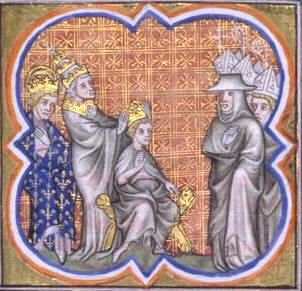 Hadrian's life is a consolation to those who make a slow start in life. Born
near St. Alban's, England, Nicholas Breakspear started slowly indeed. Educated
at the famous abbey of St. Albans, Nicholas was refused admission as a monk,
probably owing to indolence. After further studies and some drifting in France,
he became abbot of the Monastery of St. Rufus near Avignon. But the community
grew to dislike him so much that for the sake of peace Pope Eugenius removed
him.
Hadrian's life is a consolation to those who make a slow start in life. Born
near St. Alban's, England, Nicholas Breakspear started slowly indeed. Educated
at the famous abbey of St. Albans, Nicholas was refused admission as a monk,
probably owing to indolence. After further studies and some drifting in France,
he became abbot of the Monastery of St. Rufus near Avignon. But the community
grew to dislike him so much that for the sake of peace Pope Eugenius removed
him.
The Pope, however, showed what he thought of Nicholas by making him bishop of
Albano and cardinal. Cardinal Nicholas was sent on a difficult and delicate
mission. Norway and Sweden were becoming restive because their bishops were
under the archbishop of Lund in Denmark. Nicholas handled this affair with great
wisdom and tact. Shortly after he returned from his Scandinavian mission, Pope
Anastasius died and the cardinals elected Nicholas by acclamation. Unwillingly
he accepted. He took the name Hadrian IV. The cardinals chose well. Hadrian was
big. It is pleasant to relate that he showered favors on St. Albans, the
monastery which rejected him, and St. Rufus, the monastery which had driven him
out. Hadrian is noteworthy as the only English pope --and also because he gave
Ireland to King Henry II of England. He allowed Arnold of Brescia, that stormy
petrel of Roman politics, to be executed. He fought the Normans and was beaten
by them at Benevento in 1156. But overshadowing all other events of his reign
was the start of the papacy Hohenstaufen fight. Frederick of Hohenstaufen, the
emperor, was filled with absolutist ideas. At first, indeed, he helped Hadrian,
but a clash between an emperor consumed with power lust, and a pope determined
to be independent was inevitable.
At the diet of Besancon the growing strain snapped the cable of understanding
with a crash that reverberated around Europe. The Pope had sent legates with a
letter reproving the Emperor because he had allowed the murder of the archbishop
of Lund by a robber baron to go unpunished. In the letter Hadrian appealed to
the Emperor's gratitude because of the benefits he had given him. The Germans
took this to mean that the Pope claimed to have given Frederick the empire as a
fief! Frederick sent the delegates packing, and although Hadrian explained that
by the word "beneficia" he meant not fiefs but benefits, real peace did not
come. In 1158 Frederick captured Milan, and with the Lombard cities overawed,
proceeded to hold the famous diet of Roncaglia. There he played the absolutist,
and practically destroyed the self-rule of the Lombard cities. Hadrian demanded
that he recognize the Pope's independence in Rome. Frederick's answer was to
stir up the Romans to drive Hadrian out of the city. Hadrian threw his support
to the embattled communes of Lombardy. In the midst of this strife Hadrian died
at Anagni, September 11, 1159.
Excerpted from "Popes
Through the Ages" by Joseph Brusher, S.J.

